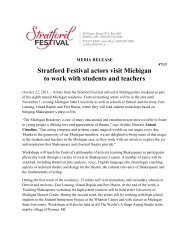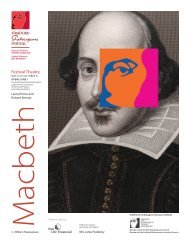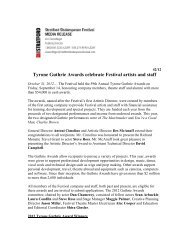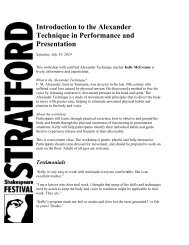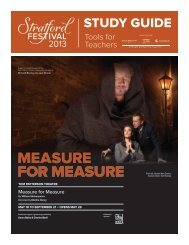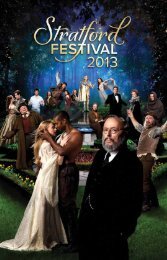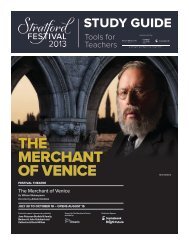Cyrano Cover.indd - Stratford Festival
Cyrano Cover.indd - Stratford Festival
Cyrano Cover.indd - Stratford Festival
Create successful ePaper yourself
Turn your PDF publications into a flip-book with our unique Google optimized e-Paper software.
French history. In the land of revolution andrepublicanism, this conflict would be a litmus testfor those who truly believed in equality, and calledinto question the anti-Semitism that was entrenchedin French bureaucracy and government. AlthoughRostand was initially reluctant to involve himselfin the controversial case, he nonetheless countedhimself a Dreyfussard, supporting an individual’sright for justice within a monolithic and imperfectstate. Indeed, one can argue that <strong>Cyrano</strong> sharesmetaphorical elements with the affaire, presenting aprotagonist who fights for love and happiness withina society that ostracizes him.Rostand did not fear the controversy that hadgreeted the original Romantics seventy years before;he worried that his play might be simply ignoredor deemed irrelevant and vieux jeu. Days beforethe première, Rostand had lost confidence in thematerial, and apologized to the great Coquelinfor involving the actor in this certain theatricalcatastrophe. Within months, however, Rostand was amajor celebrity; the public looked to him as a leaderwho would recapture France’s status as a nation ofculture and civility. The play had become all thingsto all people: a romance, a jingoistic adventure, acomedy, a highbrow entertainment and a culturalcall to arms.However, neo-Romanticism did not spark themass movement in the arts that its supportershad hoped for, and proved to be short-lived.Although it would reappear in various forms,the great rush of the 20th century would proveincompatible with neo-Romanticism’s idealismand sentiment. Rostand himself would nevermatch the popularity and acclaim of <strong>Cyrano</strong>,writing only two more plays before his death in1918, a victim of the great influenza epidemic. Yethis legacy and dream have not faded: <strong>Cyrano</strong> deBergerac, a play that was not of its time on so manylevels, remains a work whose power to amaze,inspire and move has proved to be timeless.Donald Carrier is the assistant director of thisproduction of <strong>Cyrano</strong> de Bergerac.Edmond Rostand – playwrightEdmond Eugène AlexisRostand was born inMarseille, France, in 1868.The son of a well-knownjournalist, he studied lawand was called to the bar,but never practised. Instead,he turned his talents towriting. In 1890, at the ofage 22, he published avolume of poems.His first play, premièring in 1894 at the Comédie-Française, was Les Romanesques, a satire on thetheme of young love. Its great success (the play laterinspired the long-running musical The Fantasticks)made Rostand the darling of the French theatreworld – in particular of the celebrated actressSarah Bernhardt, for whom he subsequently wroteseveral plays. His most popular and enduring work,however, remains <strong>Cyrano</strong> de Bergerac, written forthe French comedian Benoît Constant Coquelin. Itspremière, on December 28, 1897, was greeted withimmense popular and critical acclaim; the play wasimmediately translated into several languages andwithin a year had been mounted all over Europe andthe United States.Although he never again matched the triumphof <strong>Cyrano</strong>, Rostand enjoyed another success in 1900with L’Aiglon, a play about Napoleon’s son. In 1901 hewas elected to the Académie Française, the youngestmember ever to receive that honour.Unable to live in Paris because of his precarioushealth, Rostand built a château in the Pyrenees,where he lived with his wife, Rosemonde Gérard(also a poet). His health worsened in his later years,and he died in 1918 at the age of 49, leaving severalworks unfinished.Anthony Burgess – translator and adapterNovelist, biographer, linguist, essayist and composerAnthony Burgess was born in England on February25, 1917. The author of more than 50 works of fictionand non-fiction, he is perhaps best known for hisdystopian novel A Clockwork Orange, which directorStanley Kubrick turned into a controversial 1971 film.He died of lung cancer on November 22, 1993.5



